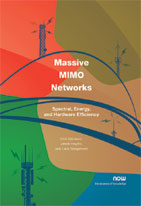Massive MIMO Networks: Spectral, Energy, and Hardware Efficiency
By Emil Björnson, Linköping University, Sweden, emil.bjornson@liu.se | Jakob Hoydis, Bell Labs, Nokia, France, jakob.hoydis@nokia.com | Luca Sanguinetti, University of Pisa, Italy, luca.sanguinetti@unipi.it
Abstract
Massive multiple-input multiple-output (MIMO) is one of the most promising technologies for the next generation of wireless communication networks because it has the potential to provide game-changing improvements in spectral efficiency (SE) and energy efficiency (EE). This monograph summarizes many years of research insights in a clear and self-contained way and provides the reader with the necessary knowledge and mathematical tools to carry out independent research in this area. Starting from a rigorous definition of Massive MIMO, the monograph covers the important aspects of channel estimation, SE, EE, hardware efficiency (HE), and various practical deployment considerations. From the beginning, a very general, yet tractable, canonical system model with spatial channel correlation is introduced. This model is used to realistically assess the SE and EE, and is later extended to also include the impact of hardware impairments. Owing to this rigorous modeling approach, a lot of classic “wisdom” about Massive MIMO, based on too simplistic system models, is shown to be questionable.
Massive MIMO Networks: Spectral, Energy, and Hardware Efficiency
Massive multiple-input multiple-output (Massive MIMO) is the latest technology that will improve the speed and throughput of wireless communication systems for years to come. Whilst there may be some debate over the origins of the term Massive MIMO and what it precisely means, this monograph describes in detail how the research conducted in the past decades lead to a scalable multiantenna technology that offers great throughput and energy efficiency under practical conditions.
Written for students, practicing engineers and researchers who want to learn the conceptual and analytical foundations of Massive MIMO, in terms of spectral, energy, and/or hardware efficiency, as well as channel estimation and practical considerations, it provides a clear and tutorial like exposition of all the major topics. It also connects the dots of the research literature covering numerous topics not easily found therein.
Massive MIMO Networks is the first monograph on the subject to cover the spatial channel correlation and consider rigorous signal processing design essential for the complete understanding by its target audience.

Replication Data | 2000000093_supp.zip (ZIP).
The monograph contains many numerical examples, which can be reproduced using Matlab code available via the DOI link below.
The authors' website https://massivemimobook.com contains the errata and exercises that can be used along with the monograph.